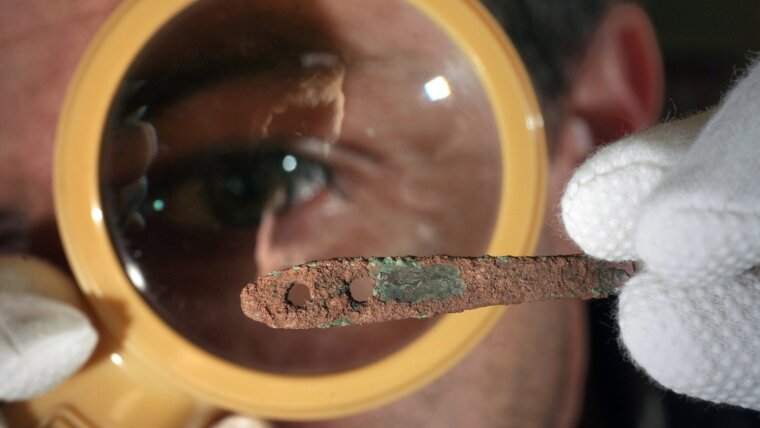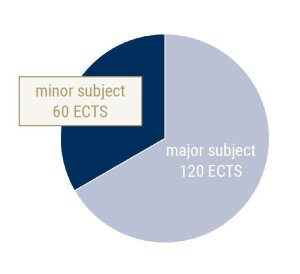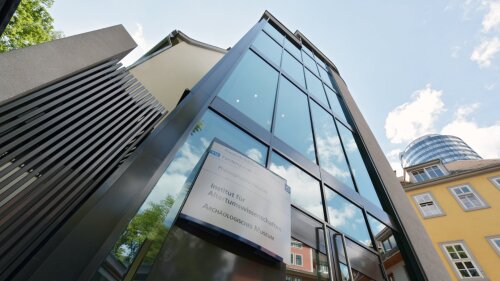Programme content
There’s no more research left to do on the fall of Pompeii and Herculaneum, right? Wrong! The settlements buried under the volcanic ash of Mount Vesuvius are yet to be fully excavated to this day. The catastrophe of 79 AD had dire consequences – but it was a real stroke of luck for today’s archaeologists, preserving everyday Roman life for posterity and revealing the many facets of the ancient world.
If you fancy yourself as a detective and want to unearth the secrets of history, ‘Classical Archaeology’ is the perfect choice for you. When travelling back in time, you sometimes have to break the confines of a lecture theatre – the ‘voices of the past’ want to be heard, examined and analysed up close. That’s why you will often swap the classroom for work outdoors. In addition to excursions and excavations, you will also have the opportunity to apply scientific methods to various ancient artefacts. After all, the University of Jena has extensive collections of ancient craftwork, coins, sculptures and other interesting artefacts.
Classical Archaeology deals with all the material remains of ancient cultures – in particular Ancient Greece and the Roman Empire from the end of the 2nd millennium BC to the middle of the 6th century AD. Other research revolves around the cultures that emerged in neighbouring periods in those parts of the world, such as the Bronze Age cultures of the Aegean (Minoan and Mycenaean civilizations), as well as the fine art and architecture of the early Christian and late Antique periods. We will also draw on findings from related disciplines in classical and art studies so that you can fully understand and interpret specific issues arising in Greco-Roman art.
Structure
Multi-subject bachelor’s programme
Picture: Sophie BartholomeA bachelor’s degree is the first professional qualification that can be obtained at a university. The standard length of the programme is six semesters, and different types of courses are offered for each module (e.g. seminars, lectures or practical classes).
A multi-subject bachelor’s programme consists of a major subject worth 120 ECTS credits (1 ECTS credit = 30 hours for attendance, preparation and follow-up work, private study, assessed coursework and examinations) and a minor subject worth 60 ECTS credits.
You can undertake a range of practical training as part of your required elective modules.
How might your degree programme shape up?
The following table shows the possible structure of your degree programme with ‘Classical Archaeology’ as your minor subject:
| 1st | 2nd | 3rd | 4th | 5th | 6th | |
| Compulsory area | Introduction to Classics (10 ECTS) | Classical Archaeology I Greece (10 ECTS) |
Classical Archaeology II Rome (10 ECTS) |
|||
| Introduction to Classical Archaeology (10 ECTS) | ||||||
| Required elective area | Internship / Advanced Classical Archaeology / Field Trip (10 to 15 ECTS) | |||||
| Interdisciplinary required elective area | Various modules and schedules (5 to 10 ECTS)* | |||||
Abbreviations: ECTS = European Credit Transfer and Accumulation System (credit points)
1 You may choose from the following modules: Introduction to Ancient History, Introduction to Greek Studies, Introduction to Latin Studies, Introduction to Mediaeval Latin and Neo-Latin Studies, Prehistory and Early History, Greek Linguistics, Introduction to the History and Cultural Anthropology of the Caucasus.
You can find more detailed information in the module catalogue for the degree programmeExternal link.
Why study in Jena?
- Cooperation with related disciplines: As part of an interdisciplinary network, our institute collaborates with other disciplines within Classical Studies as well as neighbouring disciplines such as Medieval German Studies, Romance Studies and Medieval History.
- Books and more: The central university library has a number of significant old holdings. You will also find the latest specialist literature in the smaller humanities library. That’s exactly what you need!
- Research experience: Introductory courses for students are supplemented by research-oriented teaching. This means that you will be involved in minor and major research projects during your studies.
- A world of possibilities: Experience our international flair! Our University appeals to students and researchers from all over the world and helps to shape Jena’s character as a cosmopolitan city that is fit for the future – it’s the perfect place for international studentsmp4, 57 mb · de.
- Adventures abroad: You can easily realize your dream of spending a semester abroad. We have a global network of partner universities.
What can you do after your studies?
Career opportunities:
The skills acquired during your bachelor’s degree will open up career prospects in a wide variety of areas, which will vary depending on the major subject you choose.
Downloads and links for the degree programme
What are we looking for in prospective students?
This minor subject is aimed at all bachelor’s students who would like to acquire basic knowledge of antiquity in addition to a major subject in the humanities (especially in History, Prehistory and Early History, Art History or Cultural Anthropology and Cultural History). You should have a keen interest in ancient art and cultural history.
Admission requirements
-
University entrance qualification
A university entrance qualification, such as a general secondary school leaving certificate, is required for admission onto the study programme.
More information on university entrance qualifications can be found here.
-
Language requirements
Knowledge of at least two languages at level B1 of the Common European Framework of Reference for Languages is strongly recommended. In particular, knowledge of at least one ancient language (Latin at Latinum level or Ancient Greek at Graecum level) is recommended. Language skills can be acquired or expanded during the course of the degree program.
Admission and language requirements for applicants of foreign nationality and without German Abitur: www.uni-jena.de/en/study-orientation-international
Contacts
Room 405
Fürstengraben 25
07743 Jena
Google Maps site planExternal link
Opening hours:
By appointment
Bachstraße 18k
07743 Jena
Telephone hours:
Mondays and Fridays (9:00 – 11:00)
Wednesdays (13:00 – 15:00)
The ASPA is primarily responsible for students in the Faculty of Social and Behavioural Sciences, the Faculty of Arts and Humanities, and the Faculty of Theology.
Postal address:
Akademisches Studien- und Prüfungsamt
Fürstengraben 1
07743 Jena
Fürstengraben 25
07743 Jena
Google Maps site planExternal link
University Main Building / SSZ
Fürstengraben 1
07743 Jena
Google Maps site planExternal link
Office hours:
The Central Student Advisory Service will be closed from 22 December 2025 to 2 January 2026. We will be happy to assist you again from 5 January 2026!
We offer consultations in person, by telephone, and via Zoom. You can make an appointment by calling us on +49 3641 9-411111 (Mondays to Fridays from 9:00 to 11:00) or outside these office hours on +49 3641 9-411200. You can also use our remote help desk.
Consultation hours:
Mondays, Tuesdays, Thursdays and Fridays (9:00 to 12:20), Tuesdays (14:00 to 18:00), and Wednesdays and Thursdays (14:00 to 16:00).
Video chat: To the video chat – Zoom Videochat ZeitenMondays to Fridays (12:30 to 13:00) Password ZSB2020 Data protection informationpdf, 101 kb
University Main Building, Room E065
Fürstengraben 1
07743 Jena
Google Maps site planExternal link
Opening hours:
Information Desk (UHG; Room E0.65)
Mondays (10:00 – 12:00)
Tuesdays (13:00 – 15:00)
Wednesdays (10:00 – 12:00)
Thursdays (13:00 – 15:00)
Fridays (10:00 – 12:00)
You can also use our remote help desk at
www.uni-jena.de/service-ssz
or send us your enquiries by post.
Telephone hours:
Mondays to Fridays
(9:00 – 11:00)
Postal address:
Friedrich-Schiller-Universität Jena
Studierenden-Service-Zentrum
07737 Jena
University Main Building
Fürstengraben 1
07743 Jena
Google Maps site planExternal link


